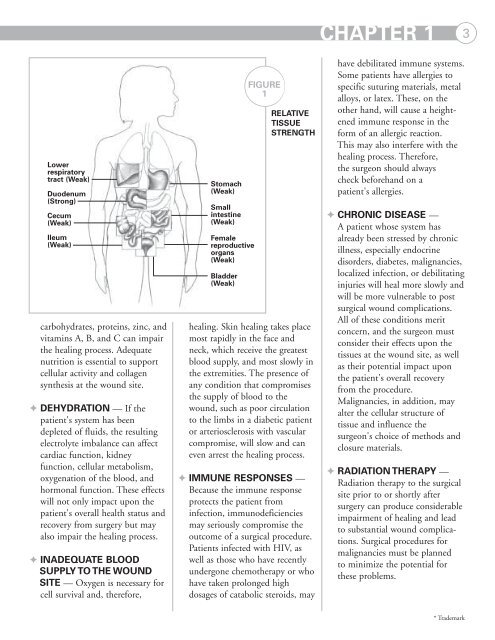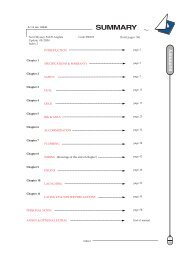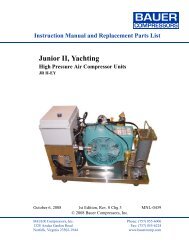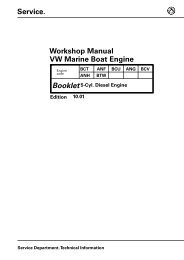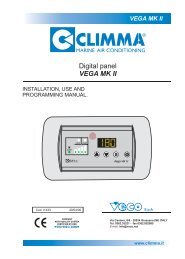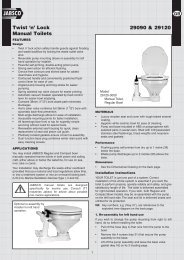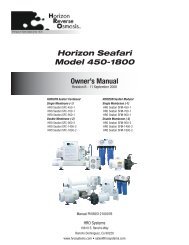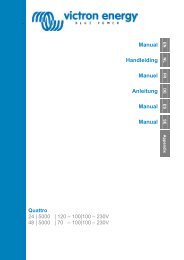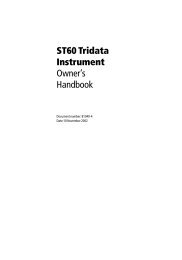Wound Closure Manual (PDF) - Penn Medicine
Wound Closure Manual (PDF) - Penn Medicine
Wound Closure Manual (PDF) - Penn Medicine
Create successful ePaper yourself
Turn your PDF publications into a flip-book with our unique Google optimized e-Paper software.
Lower<br />
respiratory<br />
tract (Weak)<br />
Duodenum<br />
(Strong)<br />
Cecum<br />
(Weak)<br />
Ileum<br />
(Weak)<br />
carbohydrates, proteins, zinc, and<br />
vitamins A, B, and C can impair<br />
the healing process. Adequate<br />
nutrition is essential to support<br />
cellular activity and collagen<br />
synthesis at the wound site.<br />
DEHYDRATION — If the<br />
patient's system has been<br />
depleted of fluids, the resulting<br />
electrolyte imbalance can affect<br />
cardiac function, kidney<br />
function, cellular metabolism,<br />
oxygenation of the blood, and<br />
hormonal function. These effects<br />
will not only impact upon the<br />
patient's overall health status and<br />
recovery from surgery but may<br />
also impair the healing process.<br />
INADEQUATE BLOOD<br />
SUPPLY TO THE WOUND<br />
SITE — Oxygen is necessary for<br />
cell survival and, therefore,<br />
Stomach<br />
(Weak)<br />
Small<br />
intestine<br />
(Weak)<br />
Female<br />
reproductive<br />
organs<br />
(Weak)<br />
Bladder<br />
(Weak)<br />
FIGURE<br />
1<br />
RELATIVE<br />
TISSUE<br />
STRENGTH<br />
healing. Skin healing takes place<br />
most rapidly in the face and<br />
neck, which receive the greatest<br />
blood supply, and most slowly in<br />
the extremities. The presence of<br />
any condition that compromises<br />
the supply of blood to the<br />
wound, such as poor circulation<br />
to the limbs in a diabetic patient<br />
or arteriosclerosis with vascular<br />
compromise, will slow and can<br />
even arrest the healing process.<br />
IMMUNE RESPONSES —<br />
Because the immune response<br />
protects the patient from<br />
infection, immunodeficiencies<br />
may seriously compromise the<br />
outcome of a surgical procedure.<br />
Patients infected with HIV, as<br />
well as those who have recently<br />
undergone chemotherapy or who<br />
have taken prolonged high<br />
dosages of catabolic steroids, may<br />
CHAPTER 1 3<br />
have debilitated immune systems.<br />
Some patients have allergies to<br />
specific suturing materials, metal<br />
alloys, or latex. These, on the<br />
other hand, will cause a heightened<br />
immune response in the<br />
form of an allergic reaction.<br />
This may also interfere with the<br />
healing process. Therefore,<br />
the surgeon should always<br />
check beforehand on a<br />
patient's allergies.<br />
CHRONIC DISEASE —<br />
A patient whose system has<br />
already been stressed by chronic<br />
illness, especially endocrine<br />
disorders, diabetes, malignancies,<br />
localized infection, or debilitating<br />
injuries will heal more slowly and<br />
will be more vulnerable to post<br />
surgical wound complications.<br />
All of these conditions merit<br />
concern, and the surgeon must<br />
consider their effects upon the<br />
tissues at the wound site, as well<br />
as their potential impact upon<br />
the patient's overall recovery<br />
from the procedure.<br />
Malignancies, in addition, may<br />
alter the cellular structure of<br />
tissue and influence the<br />
surgeon's choice of methods and<br />
closure materials.<br />
RADIATION THERAPY —<br />
Radiation therapy to the surgical<br />
site prior to or shortly after<br />
surgery can produce considerable<br />
impairment of healing and lead<br />
to substantial wound complications.<br />
Surgical procedures for<br />
malignancies must be planned<br />
to minimize the potential for<br />
these problems.<br />
* Trademark


